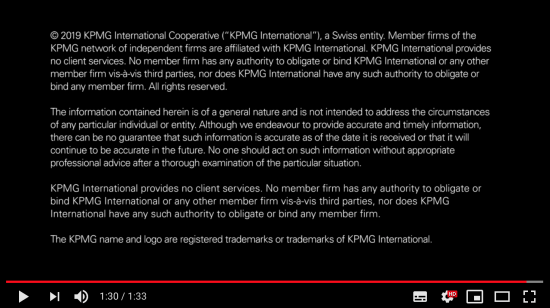This video is interesting:
I know Jane McCormick. And I know what she thinks about the Fair Tax Mark, which I co-founded. For reasons fo full disclosure, I should even add that a KPMG predecessor firm trained me as a chartered accountant.
And I have to say Jane is wrong.
She's wrong because the Fair Tax Mark has proved that it is possible to come up with a way of appraising the tax affairs of a company. Eight listed companies and fifty or so others have now signed up, and there are plenty more on their way. The Fair Tax Mark experience is that it can take up to two years to get the award. Those companies must think it's worth doing.
I am biased, of course, but I would suggest that they are right to think this worthwhile, and that they are right to think that an award from an organisation like the Fair Tax Mark is worth having a lot more than having one from KPMG. I strongly sense such an award is on its way.
There are several reasons for that. First, the Fair Tax Mark does not have to put notices like this on its videos:
 Nor is the Fair Tax Mark conflicted by being both an auditor and a supplier of tax services.
Nor is the Fair Tax Mark conflicted by being both an auditor and a supplier of tax services.
And nor does the Fair Tax Mark work in most of the world's major tax havens, unlike KPMG, which creates another massive conflict of interest when use of them is obviously a cause for concern for anyone appraising tax practice.
What is more, until this week KPMG had never endorsed public country-by-country reporting. Even now, it's not apparent to what extent they have. And this matters when use of country-by-country reporting is critical to successfully appraising good tax practice. The Fair Tax Mark requires those gaining the award to commit to it.
So what's KPMG's problem? It looks like it's deeply aggrieved by being up against an organisation that is not conflicted when it is, profoundly so. They're probably even more upset that it is really easy to spot the difference.
I stress, I know I am biased. I am a founder of the Fair Tax Mark and I was until recently a director, and I still advise it. But I really think KPMG needs to recognise that they do not have all the answers when in this case they definitely do not. And it's time that they stopped suggesting that there is any reason apart from their conflicts of interest for this being the case.
Thanks for reading this post.
You can share this post on social media of your choice by clicking these icons:
You can subscribe to this blog's daily email here.
And if you would like to support this blog you can, here:



Hello Richard
I’ve had a quick look at the FTM website. Who is it that FTM are accountable to? Who oversees the work it does? Is it professionally accredited?
I ask because accountancy firms are accountable to professional bodies for the work they do. There is someone that clients can complain to if they feel that the service they receive isn’t up to a proper professional standard.
Which government or professional accounting organisation would someone complain to in a similar position with FTM?
Thanks
It is a civil society initiative like, for example, Fair Trade
It is self-governing
There is no regulator
The same might be said for the International Financial Reporting Standard Foundation
She does say it is possible to come up with ‘a way’ to do it.
Her main point seems to be that it is impossible for anyone (which she admits includes KPMG) to come up with one way that is universally accepted. Seems so obvious to be beyond dispute.
Unless you are suggesting FTM has come up with a universally accepted way, then it seems you agree with her.
Do you always entirely miss the point, deliberately?
The main point of your post appears to be this:
“She’s wrong because the Fair Tax Mark has proved that it is possible to come up with a way of appraising the tax affairs of a company.”
She doesn’t say that. She says it is possible to come up with ‘a way’.
What she appears to say is that it is impossible to come up with something universally accepted. To date, nobody appears to do have done so.
Let’s put this another way
We know KPMG lobby their clients not to do FTM
Forgive me if I am cynical
It’s clear not all their clients agree with them
How do you ‘lobby’ clients on this in any meaningful way that would make a difference?
A client either sees the value in obtaining a FTM at the price of obtaining it, or it doesn’t.
If I were a client, the opinion of KPMG wouldn’t come into it. I assume FTM is seeking a client base with sufficient sophistication and judgement to work it out for themselves, either way.
The value doesn’t jump out at me, but it’s a free country, others can do what they want.
So what has been your point?
I seem to be missing it
My point is that I can’t see how she is disagreeing with you about anything, from this video at least.
All she is saying is that there is no single universally accepted way of doing this. Seems obvious, no?
Well, no, not to me
But let’s just disagree